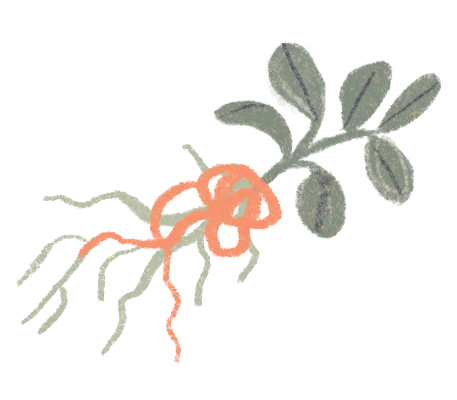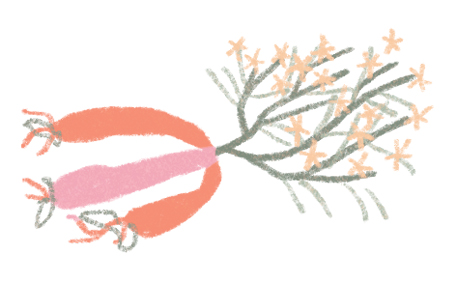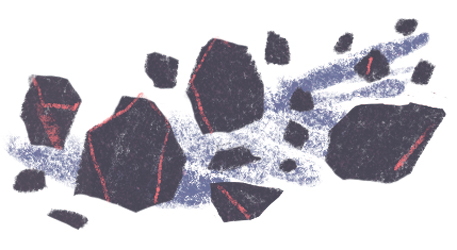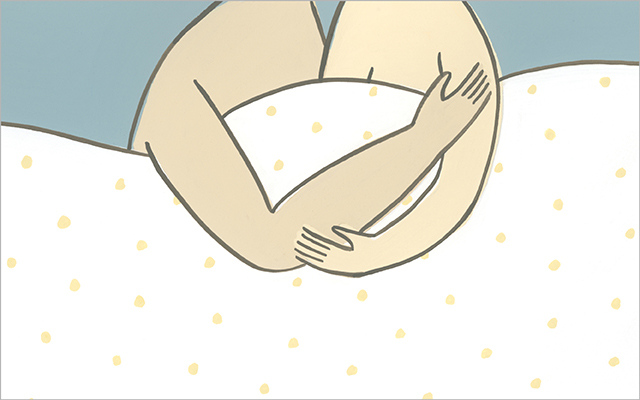Sections in this article:
DHEA ⋅ Zinc ⋅ Vitamin D ⋅ B Vitamins ⋅ Flavonoids ⋅ Herbs ⋅ Aphrodisiac Foods
Libido can be mysterious. It’s a subtle (or sometimes not-so-subtle) force, one that waxes and wanes, often due to factors beyond our conscious control or understanding.
“Libido is a primal force — it’s like an overflow of vital energy,” says naturopathic physician and licensed acupuncturist Laurie Steelsmith, ND, MS, LAc, coauthor of Great Sex, Naturally.
This feeling of overflow is most evident in our teens and 20s, when we’re likeliest to have a robust sexual energy and appetite. But this energy diminishes when we’re sick, stressed, or depleted. And it can grow more elusive as we age.
“People think of libido just as sexual appetite, but it’s a general representation of someone’s physical, mental, and spiritual health,” explains Ayurvedic practitioner Veena Haasl-Blilie, founder of Saumya Ayurveda. (Ayurveda is a system of medicine that originated in India more than 3,000 years ago.) “Libido is dynamic and affected by people’s constitution and stage of life.”
Expecting and understanding that sexual energy fluctuates over time can help us release unreasonable expectations. It can also lead us to reflect on whether our libido is in a healthy, satisfying place for us: “Is sex feeling depleting, or enjoyable and balancing?” Haasl-Blilie asks. “Those are the things to look for.”
Because libido reflects one’s overall health and energy, diet and lifestyle offer plenty of opportunities to keep things tuned up — despite what we may have internalized about sexual appetite disappearing with age. “As people get older, they can maintain that vital force,” Steelsmith says. “It’s about giving the body what it needs to function optimally.”
Food is a key piece of the puzzle, says integrative and functional nutritionist Cindi Lockhart, RDN, LD, IFNCP. “We want a big part of our diet to be colorful fruits and veggies for so many reasons — including to support libido.”
And when you’re looking for a little extra support to keep those fires burning, consider supplementing with these nutrients and herbs.
DHEA
Helps Address: Hormone Dysregulation
Dehydroepiandrosterone (DHEA) is a hormone made by the adrenal gland. It helps produce other hormones, such as testosterone and estrogen, and it counteracts the stressful effects of cortisol. “DHEA is the antiaging hormone,” says Lockhart. Levels peak around age 25 and then start to naturally decline.
Prolonged stress can lead to “adrenal fatigue,” or dysfunction of the hypothalamic-pituitary-adrenal axis, which dysregulates the body’s production of cortisol.
“When women are super stressed, they’ll have high cortisol, and maybe an upregulation of DHEA to help them meet the demands of the stress,” Steelsmith explains. “But then they can develop exhausted adrenal glands, which will then result in low DHEA.” (For more on adrenal health, see “Reset Your Stress Response.”)
What does this mean for libido? Testosterone stimulates the libido in both men and women. Because DHEA is a precursor to testosterone, low levels can lead to lower “T” and suppressed sexual appetite.
How to Supplement With DHEA:
Various tests can gauge DHEA levels in urine, saliva, and blood. Standard ranges vary by age and sex, so consult with a healthcare practitioner to interpret results. Low levels can be supplemented with pills, sublingual tablets or liquids, or topical preparations — though because of the potential for side effects and medication interactions, it’s important to take DHEA supplements only after a discussion with a knowledgeable healthcare provider.
Steelsmith advises against self-medicating with DHEA because it’s so potent: “I’ve seen women taking way too much DHEA as an over-the-counter pill and suffering side effects like acne.”
DHEA is also a precursor to estrogen, so taking too much can be a risk factor for hormone-related conditions and cancers, Lockhart adds. She recommends working with a trained practitioner and testing levels every three months for anyone supplementing with DHEA.
For her low-libido patients, Steelsmith suggests DHEA creams, which can be applied directly to the vulva and vagina. “It helps with the integrity of that tissue when hormone levels are waning [in perimenopause and menopause] and women are starting to experience more vaginal dryness, thinning, and atrophy,” she notes. There are also some topical DHEA creams for men that can be applied on thin-skinned parts of the body.
For oral doses, Lockhart recommends starting low — about 5 mg per day for women and 10 for men — and increasing as necessary. “This is a short-term product,” she adds. “You wouldn’t want to take DHEA [in the] long term.”
Zinc
Helps Address: Low Testosterone
Zinc is a key mineral for healthy testosterone levels and sperm count in men and for fertility in men and women. It helps prevent the conversion of testosterone to estrogen and support the prostate gland, which plays an important role in healthy, vital sexual function, in men.
Zinc is also critical for producing neurotransmitters, such as serotonin, dopamine, and gamma-aminobutyric acid (GABA), Steelsmith notes. These chemicals aid in regulating our mood and stress response and help us feel relaxed and sensual. This may be one reason that oysters, the most potent food source of zinc, are considered an aphrodisiac.
A 2021 randomized controlled trial examined the effect of zinc on testosterone levels and sexual function in postmenopausal women with zinc serum levels below 62 mcg/dL. (According to the National Institutes of Health, a healthy range is 80 to 120 mcg/dL.) The researchers found that zinc supplementation in the intervention group significantly improved sexual desire, arousal, orgasm, satisfaction, vaginal moisture, pain during intercourse, and overall sexual function compared with the control group.
How to Supplement With Zinc:
“Zinc is an essential mineral, meaning we can’t produce it, so we need to consume it through food or supplementation,” Lockhart says.
Unlike DHEA, which more quickly affects testosterone production, zinc and other minerals take time to accumulate in the body.
Food sources include oysters, red meat, pumpkin seeds, leafy green vegetables, bee pollen, and wheatgrass. Zinc testing can reveal whether supplementation is needed to raise your levels. (One sign of possible deficiency: white spots on your fingernails.)
Steelsmith notes that zinc supplements are generally safe and beneficial for most people due to zinc’s role in immune support and liver detoxification. She recommends a daily oral supplement dose of 25 to 50 mg. To avoid nausea, take it with food.
(See “The Health Benefits of Zinc” to learn how to tell if you’re deficient — and what you can do to optimize your zinc levels with good nutrition.)
Vitamin D
Helps Address: Low Mood
This essential nutrient plays a wide range of salutary roles, from mood regulation to the development of white blood cells. “Vitamin D is necessary for the production of dopamine,” Steelsmith says. “It’s important to have robust levels of vitamin D for your bones, your mood, and your immune system.”
Low levels of vitamin D have been associated with sexual and erectile dysfunction, Lockhart notes, as well as with low testosterone. (An ideal range is 50–80 ng/mL.)
A 2018 study in Poland found that premenopausal women who had deficient (less than 20 ng/mL) or insufficient (between 20 and 30 ng/mL) levels of vitamin D experienced improved sexual desire and satisfaction after supplementing with 2,000 to 4,000 international units (IU) of vitamin D3 daily for six months.
How to Supplement With Vitamin D:
Get 15 to 30 minutes of sunshine at least three times a week to stabilize your vitamin D levels. If you live in a climate where you’re covered up during short winter days and can’t get enough sun, many experts suggest taking at least 1,000 to 2,000 IU of supplemental vitamin D3 daily.
“Ideally, take it with vitamin K2, which helps ensure vitamin D is deposited in the bones and not the arteries, and with some healthy fat, which helps with absorption,” Lockhart says.
In rare cases, too much vitamin D can cause toxicity, so be sure to track your current levels. “I encourage people to check their vitamin D levels every six months, in the spring and fall,” Lockhart says. (For more on vitamin D, see “Vitamin D: What You Need to Know.”)
B Vitamins
Help Address: Low Energy and Blood Flow
The B vitamins help process carbohydrates, lipids, and proteins to generate energy. They include thiamine (B1), riboflavin (B2), niacin (B3), pantothenic acid (B5), pyridoxine (B6), biotin (B7), folate (B9), and cobalamin (B12).
B3, B6, and B12 help with testosterone production. B1, B2, B3, and B5 help make adenosine triphosphate, which fuels our muscles. And B3 and B12 are notably beneficial for blood circulation, including to the reproductive organs.
“B vitamins support the adrenal glands, which produce our sex hormones, and are essential to every cell in the body,” Steelsmith says. Lockhart adds that B vitamins are quickly depleted when we’re under stress.
How to Supplement With B Vitamins:
Food sources of B3, which has been shown to support blood flow and even address erectile dysfunction, include avocados, buckwheat, artichokes, kale, spinach, and many nuts and seeds.
B6, which helps activate hormone production, can be found in sweet potatoes, apples, pears, and sesame and sunflower seeds, as well as in barley, spelt, wheat, and other sprouted grains.
For B12, look to animal products: meat, eggs, dairy, and fish. It’s a good idea for vegetarians and vegans to work with a practitioner to ensure they’re getting sufficient vitamin B12.
Oral supplements are available for individual B vitamins as well as for B complex. (For more on B vitamins, see “All About B Vitamins.”)
Flavonoids
Help Address: Poor Circulation
Fun fact: Viagra was originally developed to combat high blood pressure. It helps enhance dilation of the blood vessels by increasing both the levels and activity of nitric oxide, a compound in the body that relaxes blood vessels and improves blood flow. As the drug’s developers discovered, enhanced blood flow also has a potent effect on the genitals during sexual arousal, particularly in men — though it contributes to stimulation and sensitivity in women too.
Flavonoids are natural chemicals in berries, citrus fruits, tea, and dark chocolate that enhance and regulate nitric oxide. Some of the best-known include quercetin, resveratrol, and luteolin. These compounds help protect plants from pests, and “when we ingest these compounds, they can help protect us too,” Steelsmith says.
“Flavonoids help to stabilize blood-vessel walls and promote scaffolding of the cells,” she adds. There are lots of reasons to emphasize colorful veggies and fruits in your diet, but getting the blood pumping during amorous moments may be one of the most fun.
How to Supplement With Flavonoids:
The best sources of flavonoids include tea, cocoa, leafy vegetables, onions, apples, berries, cherries, soybeans, and citrus fruits.
Flavonoids such as resveratrol, quercetin, curcumin, EGCG (epigallocatechin gallate), and luteolin are also available as individual supplements and in bioflavonoid blends. A functional nutritionist can help design meal plans that contain a variety of flavonoids.
Herbs
Unlike individual nutrients, whole herbs contain multiple elements that work together to produce specific effects. “Herbs are about nourishing and building. If someone is eating fast food and working 80 hours a week, an herb isn’t going to fix their stress. But herbs can offer laser-specific nutrition for the tissues,” says Haasl-Blilie.
They generally take time (think weeks to months) to exert their effects. Working with a licensed herbalist for personalized selection and dosing is highly recommended because herbs can be potent and interact with other medications.
“Herbs are about nourishing and building. If someone is eating fast food and working 80 hours a week, an herb isn’t going to fix their stress. But herbs can offer laser-specific nutrition for the tissues.”
These are some go-to herbs for libido support that Haasl-Blilie uses with her clients:

Ashwagandha:
“Ironically, this herb is a tonic and sedative rolled into one genius plant,” she notes. “Its energetic quality is heating. It bolsters an exhausted nervous system, which may manifest as hyper qualities, such as unstable emotions, agitation, and feeling stressed. It’s renowned for providing ‘the sexual stamina of a horse,’ and it increases overall strength, promotes restorative sleep, and increases sperm production.” (Learn more about ashwagandha at “7 Adaptogens for Health.”)

Shatavari:
“Called ‘the woman with a hundred husbands,’ this herb is a tonic for the female reproductive system and is anti-inflammatory. It is an aphrodisiac, improves strength, and enhances sexual appetite. It also promotes fertility, lactation, and sperm production.”
![]()
Tribulus (a.k.a. gokshura):
“This herb is nourishing to the reproductive system, enhances sexual appetite and potency, and improves strength,” Haasl-Blilie explains. A small randomized, double-blind, placebo-controlled study published in 2014 found that women with low sexual desire experienced significant improvement in desire, arousal, lubrication, satisfaction, and pain after consuming 7.5 mL of Tribulus extract twice a day for four weeks.
 Shilajit:
Shilajit:
“This is an exudate from Himalayan rocks, also known as mineral pitch and vegetable asphalt. It has a high mineral content, making it an amazing supplement. It is balancing for all constitutions in moderation, and it enhances sexual potency.”
Aphrodisiac Foods
Some foods are renowned for their ability to kindle our passions. An aphrodisiac is “any food or drug that arouses the sexual instinct, induces desire, and increases pleasure and performance,” says integrative dietitian Mary Purdy, MS, RDN. These are some of her favorites.
Chocolate: “The aphrodisiac qualities of chocolate can be attributed to the chemicals in it that stimulate the pleasure centers in our brains,” Purdy says.
It contains theobromine, which is a stimulant and vasodilator (increases blood flow); phenylethylamine, which stimulates the brain to release dopamine; and anandamide, which activates the brain’s pleasure receptors. No wonder we give boxes of chocolate for Valentine’s Day!
Oysters: Oysters are rich in vitamin B12, which increases energy. They’re the most abundant food source of zinc, which is a key player in testosterone and sperm production.
“Testosterone boosts libido in the fellas, but it also boosts libido in the ladies,” Purdy notes. In addition, there’s something evocative about slurping oysters from their shells — a tactile and sensual treat to share with your partner.
Honey: Hippocrates, the Greek father of modern medicine, reportedly prescribed honey to increase sexual vigor.
“Honey is rich in B vitamins, which support reproductive health and encourage virility. It also has an antioxidant called chrysin that promotes testosterone production, and a trace mineral called boron that helps with estrogen production,” Purdy says. (See “The Health Benefits of Real Honey” for more.)
Hot Peppers: “Some plants affect sexual arousal by increasing the blood flow to certain organs,” Purdy explains. Accordingly, the effects of eating foods like ginger, hot peppers, and warming spices can actually mimic our own stimulation response by getting the blood pumping. So, the next time you’re in the mood to spice things up in the bedroom, try adding a little heat in the kitchen. (See “How to Cook With Hot Peppers” for recipes, techniques, and kitchen tips.)
This article originally appeared as “Feed Your Libido” in the June 2023 issue of Experience Life.





This Post Has 0 Comments